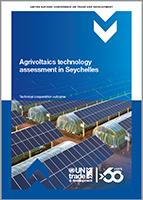
This report presents the results from the technology assessment (TA) of agrivoltaics for controlledenvironment crop production (ACE) undertaken by the Government of Seychelles under the guidance of UNCTAD. It is the primary outcome of the UNCTAD pilot Project on Technology Assessment in the Energy and Agricultural Sectors in Africa to Accelerate Progress on Science, Technology and Innovation (STI). “Technology assessment” refers to the systematic evaluation and analysis of the potential impacts, benefits, risks and challenges associated with the introduction, adoption or modification of a specific technology.
The goal of TA is to provide informed insights that can guide decision makers, policymakers and stakeholders in making well-informed choices regarding the development, deployment or regulation of technology. Moreover, this report marks an important step towards the integration of photovoltaic (PV) technology into agriculture, aligning with the country’s objectives outlined in the National Development Strategy 2019–2023.
Core problems in Seychelles are food and nutrition insecurity, the country’s vulnerability to geopolitical instability, and the adverse effects of local climate on crop production, which have been exacerbated by climate change. ACE is well-positioned to address these issues for two main reasons. First, this technology has the potential to guarantee the production of freshly grown vegetables throughout the year. Second, it can help mitigate the adversity of the local climate and climate change on crop production, in particular torrential rainfall, high temperatures and humidity.
The report provides an overview of the national development plans and policy documents and strategies concerning ACE. Additionally, this report examines the status of the agriculture and energy sectors, which have been analysed in terms of the strengths, weaknesses, opportunities and threats (SWOT) vis-à-vis the opportunities and challenges of the technology.
The SWOT analyses reveal that, in general, there are a number of strengths related to policies and strategies being put forward by the government. Those strengths present opportunities for the deployment of ACE. However, some weaknesses are mainly associated with regulations, research and development (R&D), capacity-building, and institutional organization, which present significant threats to the successful adoption of the technology.
By mapping the Seychelles National Innovation System (NIS), this report also helps understand the level of readiness and preparedness of the country’s innovation ecosystem for implementing the technology.


